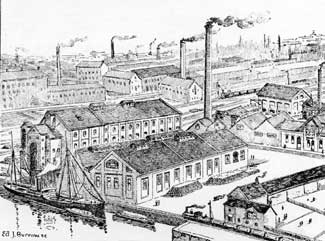Early Years
Following
a fire at their former premises at Evesham, the two Foster brothers
set up a new mill and warehouse at Gloucester in 1862 to take advantage
of direct access by sea-going ships. Batches of imported linseed
and cotton seed were crushed, heated and then pressed to extract
the oil, and the residue was sold as cattle cake. The products were
mainly sent out by rail from a siding adjoining the mill. In the
early years, they had about ten employees.
 Expansion Expansion
A
major expansion of the premises was carried out in 1891-93 to provide
more milling capacity and warehouse space with a detached boiler
house and a tank house to the east. The output capacity was 600
tons per week, and the workforce increased to over 100, including
some working shifts. Working conditions were not pleasant due to
the heat applied before pressing. In 1899, the business joined with
sixteen other similar firms around the country to form British Oil
& Cake Mills Ltd (known as BOCM).
Another
phase of expansion took place in 1910, including the installation
of a second mill and a de-odorising plant in the eastern part of
the premises, and the capacity rose to 1000 tons per week. In the
1920s, a large shed was erected on the north side of Monk Meadow
Dock to contain oil storage tanks, and the oil was transferred from
the main site by a small tanker barge. In 1925 BOCM was taken over
by Lever Brothers, but the mill at Gloucester continued to be managed
by members of the Foster family until 1945.
Raw Materials and Products
During
the 1920s and 30s, Foster Bros mainly processed linseed (from Argentina,
India and Canada), cotton seed (from Egypt, Bombay and Greece) and
groundnuts (from the west coast of Africa). Most of this material
came by large ship to Sharpness and then by barge to Gloucester,
although some was brought round the coast from Hull by steamer.
The word soon spread when a barge containing groundnuts arrived,
and local lads became experts at collecting handfuls when the firm's
watchman was not looking.
Much
of the linseed oil was sold to paint and varnish manufacturers and
some was used in making linoleum. Cotton seed oil was sold for fish
frying and soap making, and groundnut oil for making margarine.
It was all sent out in barrels made on the premises. Much of the
residual cake was sold as slabs direct to farmers, while some was
mixed with grain and certain additives to produce a range of balanced
animal feeds sold in hessian sacks.
End of Oil Seed Crushing
In
the early 1950s, BOCM installed a big new oil extraction plant at
Avonmouth, using a continuous process rather than the previous batch
operations. This led to the closure of the mill at Gloucester c1955,
and the building was later sold to West Midlands Farmers. At the
same time the Monk Meadow building was converted to a distribution
depot for products made at Avonmouth. However, following the development
of the motorway network and the opening of the Severn Bridge, the
need for the distribution depot at Monk Meadow declined as customers
could readily collect from Avonmouth, and the depot closed in the
mid 1970s.
Sources: Glos Chron 26 Jul 1862, 3 Sep 1910, 3 Feb 1923; Glo
Jnl 21 May 1892; Glos Coll JV 13.1, JR 13.8, NQ 15.8; memories of
former employees. |
 Expansion
Expansion